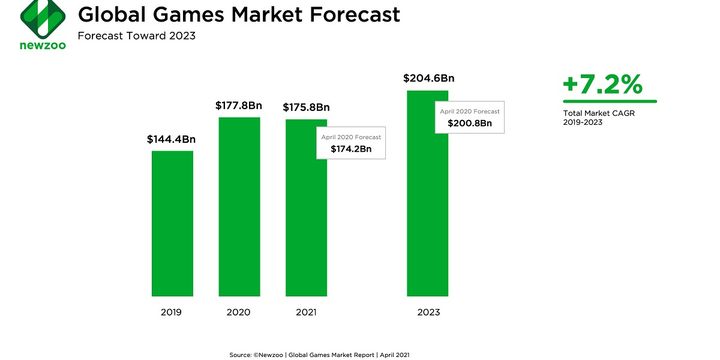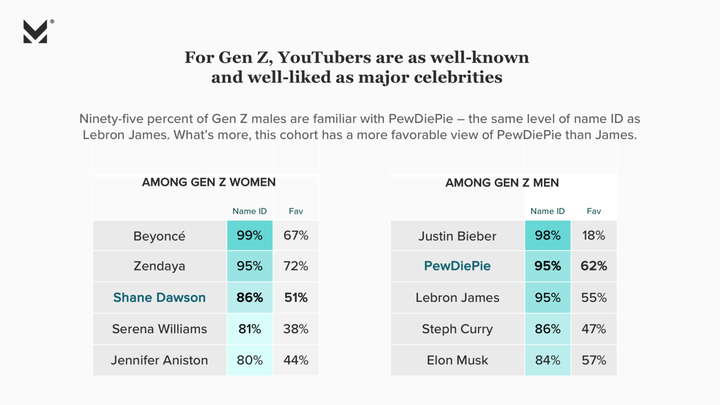Video Games Industry Is Bigger Than Film, Sports and Music
The gaming market has overtaken the movie industry - valued at nearly $180 billion in 2020 - and Gen Z values it more than sports.
3

- The value of the video game industry (approximately $180 billion) is already greater than the value of the global movie industry and the profits from sports in North America;
- Gen Z males like and respect PewDiePie more than LeBron James, and the streamer is more recognizable than Elon Musk in this group;
- More and more industries (fashion, music) are benefiting and profiting from collaborations with video game developers. Games are coming out on top in the cultural race.
The video game industry has grown at a rapid pace over the past few years, thanks in part to the rise in popularity of eSports, a greater range of F2P (free-to-play) games, MMOs (massive multiplayer online) or mobile apps. The pandemic also contributed to the commercial success of game developers; people holed up in their homes and spent more time on entertainment and more money on new games. The video game market grew to the point where it surpassed the movie industry combined with the sports industry in North America. In 2019, the film industry reached $100 billion for the first time in history, while in 2020, the combined sports revenue in North America was over $75 billion - in the same year, the gaming industry generated revenue of nearly $180 billion.

The size of the video game industry and the interest in it is evident not only in financial charts, but also in research on individual recognition. Morning Consult's 2019 report provides some very interesting findings about Gen-Z Americans - 95% of males recognize both LeBron James and PewDiePie, but PewDiePie is perceived better. Equally interesting, Gen-Z males associate PewDiePie better than Elon Musk.

The value of the video game industry exceeded the combined value of the largest professional sports leagues and organizations in North America. In contrast, the prizes provided for the Super Bowl, the final championship game of the NFL, or The Masters Tournament, one of the biggest golf tournaments, were almost three times smaller than those provided for The International 9, the 2019 Dota 2 World Championship. The prize pool there was $30 million.
The representativeness of our industry is also growing in other industries, such as fashion. Balenciaga recently released its fall 2021 collection in the form of a game, titled Afterworld: The Age of Tomorrow; Gucci, in cooperation with Fnatic, one of the best European leagues in League of Legends, has created a limited series of watches, while Mac released a lipstick collection modelled on Honor of Kings - a game by Tencent.
Also the music industry is using famous games to attract new audiences. Some of the biggest and most spectacular concerts take place in Fortnite, for example, where Marshmello and Travis Scott have performed. Travis' concert has attracted 12 million viewers, almost double the audience of the 2020 MTV Music Awards. In the age of pandemic, video games have become great platforms for spreading different elements of culture and science, which enabled their creators to earn extra money. The entertainment scene is changing at a dizzying pace: audiences and creators alike recognise this.
Until recently, music was the element distinguishing one generation from another, binding people born in similar times together. People used to meet and integrate in clubs and at concerts; now, video games are taking over the function of entertainment and socialisation - in a study conducted by Whistle 68% of Gen-Z males feel that gaming is a big part of their identity and 74% say video games help them stay in touch with friends and acquaintances. 91% said they play regularly.
While the music industry is in crisis and the film industry is facing big problems, games are triumphing - our field is breaking out into the lead and there is a good chance that it will continue to grow even after the pandemic. The golden era of developer studios, eSports, streamers, or just casual gamers from mobile MMO games has arrived. We're spreading our wings even wider, though not everyone can adapt to these changes. Trevis McFedris, co-founder of virtual influencer Lil Miquela, recently tweeted:
“Gaming is replacing music as the lynchpin of emergent social scenes and it makes everyone 30+ I talk to really uncomfortable.”
- Can you live a normal life in Cyberpunk 2077? YouTuber takes on a 15-hour experiment, goes through a lot of frustration, but is eventually satisfied
- According to Baldur's Gate 3 actress, players value voice actors far more than developers do
- „The AAA industry is at its end.” Former CEO of Nexon warns of looming disaster
3
Latest News
- This is expected to be the biggest year in the company's history. Blizzard prepares an offensive that will overshadow previous years
- Bethesda envied CD Projekt RED? Starfield may undergo a Cyberpunk 2077-style metamorphosis
- Season 2 has just started, and Todd Howard is already writing the script for the third one. Fallout 5 will be changed by the TV show
- 5 games to grab on Amazon Prime Gaming. Among them, a collection of RPG classics
- My experience attending the 2025 Game Awards, and why I loved it

